A few volunteers from Team Experience are revisiting Federico Fellini classics for his centennial. Here's Cláudio Alves...
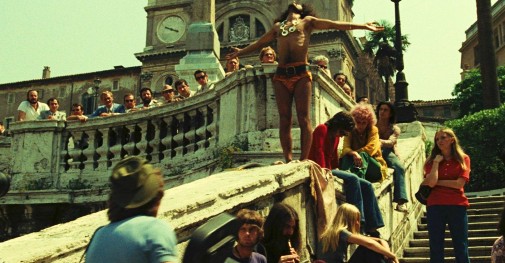
If Rome is the Eternal City, then Federico Fellini might be the Eternal Filmmaker. His cinema exists outside of time, both ancient and strangely new. A filmography that's a circus of pleasures where the grotesque and the beautiful are hand-in-hand, always dancing to a song of transgression and perversity. The faith of the church and the clown's laughter coexist too, precariously, but assuredly, and the images their communion produce are profane marvels. Like ancient frescos, there's a patina of age to these pictures, but they're bright as if they were freshly painted by master artists.
Perhaps no single film better exemplifies these wonderful contradictions than Fellini's Roma…
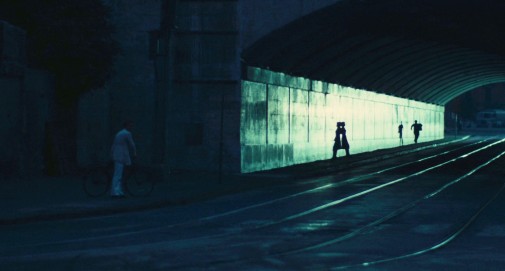
This 1972 symphony for a city is made out of two interlaced travelogues, one set in the past and the other in the filmmaker's present. Both are semiautobiographical, telling of Fellini's relationship to the city from whence his mother came and to where he traveled at the age of 19. That odyssey is shown in the first storyline. It all starts with the beginning of Rome and the beginning of Fellini, his youth spent in a fascist ruled Italy where poverty is rampant and the cinemas are smoky sanctuaries that offer windows to another world of lustful entertainment.
Young Federico moves from the province to the city, from the order of a religious family to the busyness of the capital. The house where he rents a room is a wonderful ecosystem of Italian eccentrics, all of them filmed with a healthy mix of humor and adoration. Fellini loves these strange figures, but he also lives to highlight their stranger qualities, laughing at them while also singing a song in their honor. This is particularly evident when the young director-to-be visits a couple of brothels. In those havens of fulfilled fantasy, women parade themselves like actresses in a vaudevillian show, their beauty made unsettling by the heavy make-up and bizarre costumes. All the world's a circus in Fellini-land. Or perhaps all the world's a movie.
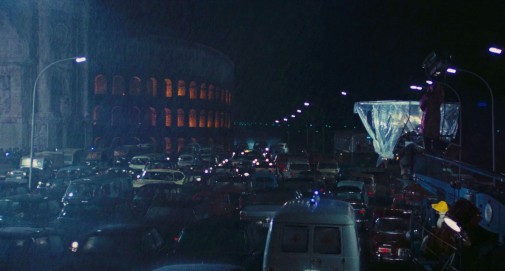
A fictional movie shoot’s what gives shape to the director's second trip to Rome in the 70s, with a film crew in tow and a cynical eye ready to find madness in the advent of modernity. Going to the capital is no longer a provincial pilgrimage made by hopeful youths, but a stilted procession through asphalt rivers saturated with noisy traffic. Though there's also beauty in this cacophony and while Fellini's camera might look in horror to the highway, it finds a hint of gleefulness too. The car lights make the crumpled space of a traffic jam into a traveling discotheque, each foggy window a proscenium into a different play of domestic life on the move. In this modern chaos, there's still fun to be had in roman life.
That's the key to this film's success. Yes, it's shapeless in form and structure, but it's also seductive and ever-stimulating. The two timelines develop in alternating vignettes, with little in the way of clear motivation, but there's a liveliness to everything they show. The spectator is never bored, not when there's so much to see, to laugh and gawk at in awe. There's the glory of History in communion with the mundane, rotting art and poisonous politics dying away in palimpsests of overlapped posters. There's myth and opera buffa, the tragedy of day-to-day life and the jet set. Even the affairs of the church are turned into a spectacle as ridiculous as it's ravishing, with a fashion show of clerical vestments designed by Danilo Donati.
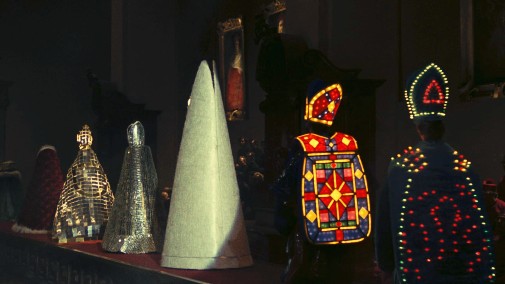
In a way, we, the audience, are like wandering spirits flying through a city made of Fellini's favorite characters, a new perplexing sight to be found in every corner. Maybe that's a haughty conversation with Gore Vidal, a glimpse at Anna Magnani (Mamma Roma herself) in her final film role or a Christmas-time parade of bikers. The hints of documentary mixed with circus buffoonery, a perfect summation of a career that started in neorealism and moved unto the surreal and the absurd, from the harsh reality of the streets to the circus of dreamers and depraved aristocrats. Fellini's Roma is like Fellini's cinema as a whole. It's history, it's architecture, it's memory and it's dream. Rome is life and life is cinema.
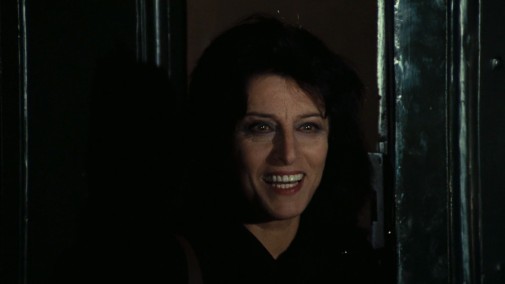
Viva Roma! Viva Cinema! Viva Fellini!